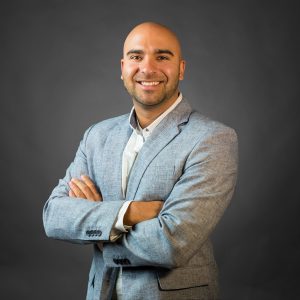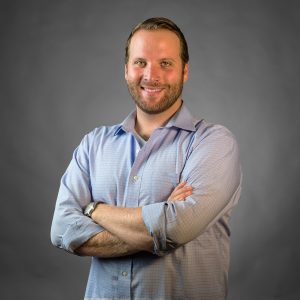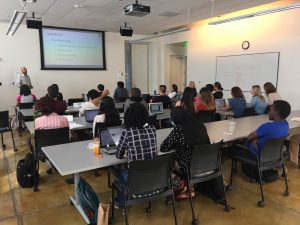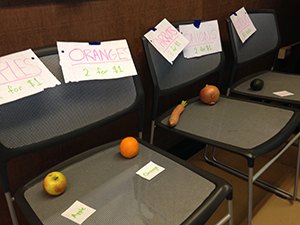By Peter Bittner
Hash Zahed and Ryan Shaening Pokrasso met at UC Berkeley Law and now are partners in their own firm, SPZ Legal, focusing on social enterprises that use business as a tool for positive change. Fed up with the paradigm that doing business and doing good are mutually-exclusive, their firm specializes in serving clients focused on the “triple bottom line,” measuring success in terms of people, planet, and profit. In their spare time, they give back to Berkeley — serving as judges and mentors for Big Ideas, providing legal advice to social start ups via the Blum Center’s Practitioners in Residence program, and guest lecturing in the Social Innovator OnRamp class, a course dedicated to nurturing social enterprises that are seeded in competitions like Big Ideas.

1) How did you get where you are today?
Hash:
I was born in Iran. I’ve always had an international appreciation for the way I look at the world. I went to undergrad at Berkeley and then did consulting work at a small consulting firm in Oakland, Mason Tillman Associates, for a year to advocate for minority- and women–owned businesses in public contracting. I realized the challenges that small businesses face in competing with large corporations, and learned the importance of law and policy in leveling the playing field.
I went to law school and then did a one-year fellowship at UC Berkeley Law School through the New Business Counseling Practicum, which is the only way to get real hands-on experience at the law school outside of the litigation context – i.e. providing transactional legal services. At the Practicum, I assisted in advising non-profits and small businesses, who otherwise would not have access to sound legal advice, with navigating the legal landscape of starting a business. I enjoyed working with entrepreneurs so much, I decided to do it for a living.
Ryan:

I came to the legal profession by way of non-profit policy advocacy work. I originally studied ecology and evolutionary biology in undergrad. I became extremely concerned about climate change and started working at a non-profit in Santa Fe, New Mexico and talked with businesses about their role in helping solve the environmental crisis.
I went off to law school because I originally thought I wanted to study environmental law, but I found that businesses can play a large role in causing a lot of change. I also found that environmental law involves a lot of litigation whereas businesses, particularly in social impact, are all about trying to build something constructive. I saw law as a real opportunity to create and assist new businesses who wanted to impact the world in more positive ways.
On Hash and Ryan Meeting:
We met before law school started at Admitted Students Day, when prospective students come to the campus to learn about the school and get to know one another. We immediately got along and decided to live together, and did so all three years of law school. Being that we both came from entrepreneurial families, we always talked about starting our own practice one day. After our respective fellowships, we decided to take the dive instead of waiting around for the right time. Starting a practice recently out of law school is not the norm, so there was definitely some level of anxiety when we first got started. But we feel that having gone through the experience of starting a new business makes us better advisors to our clients.
2) How did you get involved with the Blum Center? What do you do?
Hash and Ryan:
We first met folks from the Blum Center last year at the Berkeley Entrepreneurs Expo, a few months before the Big Ideas contest was about to begin. We were Practitioners in Residence, which connects on-campus innovators and social entrepreneurs with a wide range of experts from Industry, non-profits, government, and social enterprises. We were also judges, and mentors in the Energy and Resource category and in the Global Health category in the 2015-16 competition.
3) Why do you volunteer with Big Ideas? What do you get out of it?
Hash:
We get a lot out of it. We get inspired. The students really are thinking big about solving some of the biggest problems in the world.
When you’re starting an early-stage venture, there’s not a lot of resources out there to help you out. We’re happy to walk teams through the process of thinking where the money is going to come from – how are they going to make it as a sustainable venture – whether that’s as a for-profit or non-profit legal structure.
Ryan:
What keeps me excited is the novelty of the ideas from the teams. They come with idealistic energy, but they’re not unfeasible. I have to add that we also are amazed at some of the complex legal issues that come up for Big Ideas teams, whether it’s issues in international law or intellectual property rights. We’ve especially enjoyed helping several science-heavy teams navigate through the complex legal terrain.

4) As former judges, what are some tips you have for Big Ideas teams in the competition?
Hash and Ryan:
Really take advantage of the time and use the mentors and resources provided to you. The Big Ideas contest is an accelerator and the more students invest in the experience, the more they will get out of it—and the better they will do. We’ll also add that the teams that have the most realistic budgets and feasible plans for implementation have an advantage. The more detail you include and research you can put into the proposal, the better the outcome in our view as judges.
5) As the 2016-2017 competition gets underway, what are your hopes for the program?
Hash and Ryan:
We want to see the program continue to grow! We’re very passionate about entrepreneurship and, as alums, are still very involved at Cal. It’s exciting to see the Big Ideas contest gain such stature nationally—and even internationally—and to be a part of something impactful.
We also plan to hold a larger workshop on social enterprise organizational structure open to all teams to be able to share our expertise with more students. We have already delivered seminars to both the core Development Engineering class and the Social Innovator OnRamp course on legal forms for social start ups, and greatly look forward to our continued involvement with the Blum Center.






